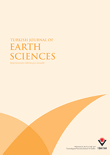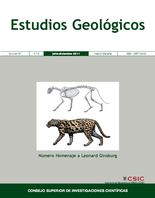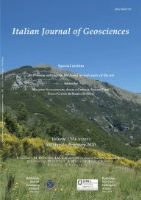
GEOLOGICA BELGICA
metrics 2024
Driving Impactful Research in Earth and Planetary Sciences
Introduction
GEOLOGICA BELGICA is a distinguished open access journal dedicated to advancing the field of Earth and Planetary Sciences, published by Geologica Belgica Luxemburga Scientia & Professionis. With an ISSN of 1374-8505 and E-ISSN of 2034-1954, the journal has been a beacon of knowledge since its establishment in 1998, ensuring the broad accessibility of crucial research findings. Based in Brussels, Belgium, the journal is recognized for its impactful contributions and has achieved a commendable Q2 ranking in the Earth and Planetary Sciences category for 2023. This makes it a vital resource for researchers, professionals, and students alike, encouraging the dissemination of cutting-edge research. Spanning a diverse range of topics within its scope and converging from 2007 to 2024, GEOLOGICA BELGICA remains committed to fostering dialogue and collaboration among earth scientists globally, further enhancing its relevance and influence in this essential field of study.
Metrics 2024
 0.49
0.49 1.20
1.20 1.00
1.00 26
26Metrics History
Rank 2024
IF (Web Of Science)
JCI (Web Of Science)
Quartile History
Similar Journals

JOURNAL OF THE GEOLOGICAL SOCIETY OF INDIA
Pioneering research for a sustainable geological future.JOURNAL OF THE GEOLOGICAL SOCIETY OF INDIA, published by Springer India, serves as a pivotal platform for researchers and practitioners in the field of geology. Established in 1979, this journal has been instrumental in advancing geological research throughout India, showcasing both regional studies and cutting-edge global research. With its Category Quartile ranking of Q3 in the geology category for 2023, and a significant Scopus rank of 171 among 321 journals in Earth and Planetary Sciences, it remains a respected source of scholarly activity. The journal is dedicated to the dissemination of original research articles, reviews, and case studies that encapsulate the dynamic scope of geological science, thus contributing to the understanding of geological phenomena. Although currently not offering open access, the journal maintains a commitment to high-quality scholarship and aims to engage a diverse readership, enhancing the knowledge and practice of geology across various disciplines.

Swiss Journal of Geosciences
Exploring the Depths of Geoscientific KnowledgeSwiss Journal of Geosciences is a prestigious academic journal dedicated to advancing the field of geosciences, published by SPRINGER INTERNATIONAL PUBLISHING AG. Since its inception in 2007, the journal has established itself as a leading platform for disseminating high-quality research findings in various domains related to Earth and planetary sciences, achieving a notable Q1 ranking in Geology as of 2023. With a solid reputation reflected in its Scopus ranking of Rank #72/321, the journal stands in the 77th percentile within its category. Based in Switzerland, the Swiss Journal of Geosciences embraces an open access model, making it easier for researchers, professionals, and students worldwide to access vital geological research without barriers. The journal’s objectives include promoting interdisciplinary research and fostering insights that address both fundamental and applied geoscientific problems, ensuring it remains a crucial resource for those seeking to understand our planet’s dynamics. Engage with pioneering research and contribute to the vibrant community of geoscientists by exploring the impactful articles published within its pages.

JOURNAL OF IBERIAN GEOLOGY
Unveiling the intricate layers of Iberian geological phenomena.JOURNAL OF IBERIAN GEOLOGY, published by Springer International Publishing AG, is a pivotal platform dedicated to advancing the field of geology and stratigraphy. With an ISSN of 1698-6180 and E-ISSN of 1886-7995, this journal has earned its reputation in the academic community, holding a commendable Q2 ranking in both Geology and Stratigraphy for 2023, reflecting its contributions to contemporary geological research. Spanning from 2007 to 2024, it provides a comprehensive forum for scholars and practitioners from around the globe to disseminate their findings pertaining to the Iberian Peninsula, enhancing the understanding of regional geological phenomena. The journal has carved out a significant niche within the Earth and Planetary Sciences, ranking #137 out of 321 in Geology and #24 out of 55 in Stratigraphy, indicating its wide-reaching impact and scholarly engagement. The Journal of Iberian Geology serves as an indispensable resource for those interested in the complexities of geological structures, stratigraphic sequences, and the broader implications of geological research, making it a vital reference for researchers, professionals, and students alike.

GEOLOGIA CROATICA
Unveiling Earth's Secrets for a Global AudienceGEOLOGIA CROATICA is a distinguished open-access journal published by the Croatian Geological Survey, dedicated to advancing the field of Earth and planetary sciences. Since its inception in 1992, this peer-reviewed journal has become an essential resource for researchers, professionals, and students interested in various aspects of geology. With its robust impact factor and a prestigious place in Scopus rankings, ranking 127th out of 321 in Geology and 77th out of 159 in miscellaneous Earth and Planetary Sciences as of 2023, GEOLOGIA CROATICA maintains a strong international presence. It provides a platform for the dissemination of critical research findings, promoting collaboration and knowledge sharing among the global scientific community. By focusing on high-quality manuscripts that cover geological processes, hazards, and resources, this journal is pivotal for anyone looking to contribute to or expand their understanding of geological sciences. The journal's commitment to open access ensures that invaluable research is accessible to all, fostering a more informed and scientifically engaged society.

TURKISH JOURNAL OF EARTH SCIENCES
Unveiling the Secrets of Our PlanetTURKISH JOURNAL OF EARTH SCIENCES, published by the Tubitak Scientific & Technological Research Council Turkey, is a premier platform dedicated to advancing the field of Earth and Planetary Sciences. With an ISSN of 1300-0985, this journal has been a significant contributor to the international scientific community since its inception in 2002, and is set to continue publishing groundbreaking research through 2024. As a recognized journal in the Q2 quartile of Earth and Planetary Sciences, it ranks #98 out of 195 in its category according to Scopus metrics, positioning it within the 50th percentile of its field. The journal emphasizes peer-reviewed research, providing invaluable insights that facilitate scholarly discourse and promote rigorous investigation into various aspects of the Earth sciences. Although it does not currently offer open access, the journal remains a vital resource for academics, professionals, and students seeking to deepen their understanding of geological phenomena and contribute to the advancement of this essential discipline.

ESTUDIOS GEOLOGICOS-MADRID
Exploring Earth's Mysteries, One Study at a Time.ESTUDIOS GEOLOGICOS-MADRID is a prominent journal in the field of geology, published by the esteemed Consejo Superior de Investigaciones Científicas (CSIC) in Spain. Established in 1976, this Open Access journal has been a vital resource for researchers and professionals since its inception. With an impact factor reflecting its contribution to the Earth and Planetary Sciences community, ESTUDIOS GEOLOGICOS-MADRID currently holds a Q3 category ranking in Geology as of 2023, showcasing its relevance and quality within the discipline. The journal publishes a diverse array of geological studies, ensuring wide-reaching access to significant research findings, thereby promoting collaboration and knowledge sharing. Established as a platform for both foundational research and applied geology, this journal fosters academic growth and contributes to understanding the Earth’s processes. Researchers, professionals, and students are encouraged to explore its extensive archive, which includes publications from 1976 to the present. For more information, visit the journal's editorial office at Editorial CSIC, C/VITRUVIO 8, 28006 MADRID, SPAIN.

Journal of Geosciences
Championing Open Access for Global Geoscientific CollaborationJournal of Geosciences is a distinguished peer-reviewed journal published by CESKA GEOLOGICKA SPOLECNOST, based in the Czech Republic, that serves as a vital platform for the dissemination of innovative research in the field of Earth and Planetary Sciences. With an ISSN of 1802-6222 and E-ISSN of 1803-1943, this journal has established its significance within the academic community, evidenced by its Q3 ranking in both Earth and Planetary Sciences and Geology. The journal covers a broad array of topics, making it an essential resource for researchers, professionals, and students interested in geoscientific advancements and discoveries. The Journal of Geosciences reflects a commitment to high-quality scholarship, embracing a variety of methodologies and interdisciplinary approaches, and provides open access to its content, thereby encouraging global collaboration and knowledge sharing among geoscientists. With a publication history converging from 2007 to 2024, it continues to be a prominent venue for critical conversations and developments in the ever-evolving field of geosciences.

ANNALES SOCIETATIS GEOLOGORUM POLONIAE
Advancing Geological Knowledge, One Article at a Time.ANNALES SOCIETATIS GEOLOGORUM POLONIAE is a distinguished journal published by the Polish Geological Society, focusing on pivotal research in the fields of geology, economic geology, and stratigraphy. With an ISSN of 0208-9068, this journal has established itself as an essential platform for disseminating significant findings and advancements in geological sciences since its convergence in 2008. The journal proudly holds a Q2 quartile ranking in the categories of Economic Geology, Geology, and Stratigraphy as of 2023, indicating its respectable position within the global academic community. Researchers will find its indexed status in Scopus, ranking #138/321 in Geology and showcasing a solid presence in key geological sub-disciplines. While the journal is not open access, it remains a vital resource for professionals and students striving for insight into contemporary geological research. Located in Krakow, Poland, the journal continues to contribute significantly to the understanding of geological processes and resources, making it an indispensable reference for anyone in the field.

Italian Journal of Geosciences
Connecting Scholars: A Gateway to Earth and Planetary SciencesItalian Journal of Geosciences, published by the Società Geologica Italiana, is a distinguished platform for the dissemination of research in the fields of Earth and Planetary Sciences and Geology. With an impressive impact factor reflected in its 2023 rankings, where it placed in the Q3 category across its related fields, this journal serves as a vital resource for academics, practitioners, and students. Established in 2010 and poised to continue until 2024, the journal showcases critical advancements and interdisciplinary studies that deepen our understanding of geological processes and Earth systems. Operating under open access options, it offers robust accessibility to a broad audience, facilitating wider dissemination of knowledge. The journal's affiliation with Università degli Studi La Sapienza in Rome, Italy, further underscores its commitment to academic excellence and innovation in geosciences.

Journal of Himalayan Earth Sciences
Pioneering Insights into Himalayan Geological WondersThe Journal of Himalayan Earth Sciences (ISSN: 1994-3237; E-ISSN: 2305-6959) is a distinguished publication by UNIV PESHAWAR, dedicated to advancing knowledge in the field of earth sciences, particularly as they relate to the Himalayan region. Established in 2013, this journal aims to provide a platform for researchers, professionals, and students to share original research findings, reviews, and innovative methodologies that contribute to the understanding of geological and environmental phenomena in this ecologically significant area. Despite being categorized in Q4 of the Earth and Planetary Sciences, the journal showcases valuable contributions to the scientific community and encourages submissions that delve into both the challenges and advancements within Earth sciences, with a particular focus on the unique geological structures and processes of the Himalayas. As an open-access journal, it ensures that research is accessible to a global readership, promoting collaboration and discussion among scholars and practitioners. The journal's operational base in Peshawar, Pakistan, places it at the heart of Himalayan research, making it an invaluable resource for those invested in earth sciences.